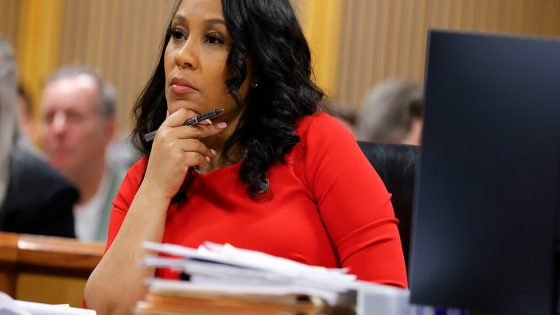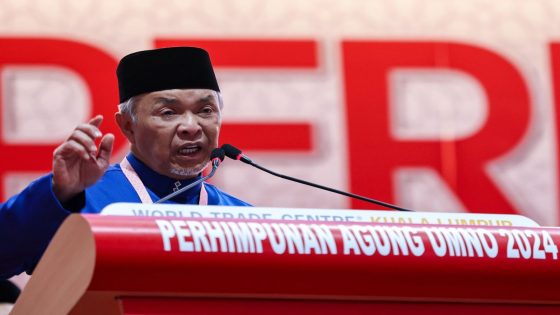An Atlanta judge ruled on Friday that Fani T. Willis, the Fulton County district attorney, could continue leading the election interference prosecution of former President Donald J. Trump and his allies in Georgia, but only if her former romantic partner, Nathan J. Wade, withdrew from the case.
The highly anticipated ruling by Judge Scott McAfee of Fulton Superior Court cut a middle path between removing Ms. Willis for a conflict of interest, which defense lawyers had sought, and her full vindication. The judge sharply criticized Ms. Willis for dating Mr. Wade, whom she hired as a special prosecutor on the case, calling it a “tremendous lapse in judgment.”
Hours after the ruling, Ms. Willis said that Mr. Wade had offered his resignation, and that she had accepted it.
Judge McAfee had rejected a defense claim that the relationship had raised an actual conflict of interest by giving Ms. Willis a financial stake in the case. But he found that it had raised “a significant appearance of impropriety” that needed to be addressed.
Disqualifying Ms. Willis and her office from the case was not necessary, the judge said, when “a less drastic and sufficiently remedial option is available.” But he concluded that “the prosecution of this case cannot proceed until the state selects one of two options.” Either Ms. Willis could have stepped aside with her office, including with Mr. Wade, or he had to leave.
Ms. Willis and her office did not respond directly to the ruling. But in announcing Mr. Wade’s resignation in a letter, Ms. Willis complimented his professionalism, “as you have endured threats against you and your family, as well as unjustified attacks in the media and in court on your reputation as a lawyer.”
With delays mounting, the case is now unlikely to come to trial before the 2024 presidential election and Mr. Trump’s rematch with President Biden.
At the same time, the decision was a setback for Mr. Trump and his 14 co-defendants as it left in place the district attorney who has been pursuing the case for more than three years. But Ms. Willis has also emerged from weeks of embarrassing hearings with a bruised reputation that could color the views of a future jury, making convictions more difficult.
Caren Myers Morrison, an associate professor of law at Georgia State University, called the ruling “an extremely lucky break for the D.A.’s office,” as it allowed the case “to get the show back on the road as soon as next week.”
But, she added, the ruling was damaging to Ms. Willis because “it explicitly calls into question her judgment, her professionalism and her integrity.”
The courtroom drama surrounding the prosecutors’ relationship had in recent weeks eclipsed the underlying facts of the election case itself, which had been moving briskly toward a trial. And it turned the tables on the prosecutors, who were forced to take the witness stand and defend themselves from hostile questioning.
In his ruling, Judge McAfee said that Ms. Willis, who had a fiery turn on the stand last month, behaved in an “unprofessional manner” — a rebuke that was all the more notable given that the 34-year-old rookie judge once worked under Ms. Willis in the D.A.’s office.
The ruling was remarkable for its clarity and plain language. In explaining the essence of the problem that Ms. Willis had created by taking trips with a romantic partner who was working for her, Judge McAfee wrote that “an outsider could reasonably think that the district attorney is not exercising her independent professional judgment totally free of any compromising influence.”
Throwing Ms. Willis and her office off the case would have created significant chaos and forced a state agency to find a new prosecutor, who would have had the power to alter or even dismiss the indictment.
In his resignation letter, Mr. Wade said he was leaving the prosecution “in the interest of democracy, in dedication to the American public, and to move this case forward as quickly as possible.”
Mr. Trump and his co-defendants could appeal the ruling, as could Ms. Willis, further delaying the proceedings and leaving the matter unresolved indefinitely.
Steven H. Sadow, Mr. Trump’s main lawyer on the Georgia case, said the former president’s legal team would “use all legal options available” to continue to fight the case, strongly suggesting that his lawyers would try to appeal the order.
Ashleigh Merchant, a lawyer for Michael Roman, one of Mr. Trump’s co-defendants, claimed “vindication” on Friday for her efforts to have Ms. Willis tossed off the case. The allegations of a romance between the two prosecutors first emerged in a January filing by Ms. Merchant.
“The judge clearly agreed with the defense that the actions of Willis are a result of her poor judgment,” Ms. Merchant said in a statement, “and that there is a risk to the future of this case if she doesn’t quickly work to cure her conflict.”
The Republican-led State Senate is also reviewing the conflict-of-interest accusations, and lawmakers have empowered a new oversight commission to investigate and potentially remove prosecutors.
Judge McAfee’s decision came two days after he quashed six charges in the case against Mr. Trump and his 14 remaining co-defendants, including one related to a call that Mr. Trump made to pressure Georgia’s secretary of state in early January 2021. But he left intact the rest of the racketeering indictment, which initially included 41 counts.
The charges cover a range of accusations, including a plan to deploy fake Trump electors in Georgia, and steps some of the defendants took to access voting machines and data in a rural county. Four of the original 19 defendants have already pleaded guilty as part of cooperation agreements, while the rest have pleaded not guilty.
The Georgia criminal case is one of four that Mr. Trump currently faces around the country. All of them have been burdened with developments in recent weeks that have led to delays, disappointing critics of the former president who want him to stand trial before the November general election.
Defense lawyers had argued that the relationship between the two Georgia prosecutors created an untenable conflict of interest, because Mr. Wade was being paid through a lucrative public contract while he was also paying, at least in part, for vacations with his boss.
In her January filing, Ms. Merchant said that Mr. Wade and Ms. Willis had been “profiting personally from this prosecution” at taxpayers’ expense. Ms. Merchant also said that Mr. Wade was underqualified, and argued that the entire indictment should be dismissed.
A torrent of court filings followed, as did a number of dramatic, televised public hearings that had little to do with the indictment charging Mr. Trump and some of his allies with conspiring to overturn his 2020 election loss in Georgia.
In February, Ms. Willis herself took the witness stand and fiercely accused Ms. Merchant of lying, and described the disqualification effort as an attempt to distract the American public from her case against Mr. Trump.
“You think I’m on trial,” Ms. Willis said to Ms. Merchant. Looking toward the defense table, she added, “These people are on trial for trying to steal an election in 2020.”
She acknowledged the existence of a romantic relationship but she said that it began in 2022, after Mr. Wade began working for the district attorney’s office. She also said that the physical element of the relationship ended before the racketeering indictment was handed up in August.
And she insisted that she paid for roughly half of the vacations, but typically repaid Mr. Wade in cash.
During the hearings, Mr. Sadow assailed not only the romance and the trips, but also a speech that Ms. Willis, who is Black, gave at an Atlanta church suggesting that racism was motivating those who were scrutinizing her relationship with Mr. Wade, who is also Black.
Mr. Sadow argued that the speech created “a great likelihood of substantial prejudice towards the defendants in the eyes of the public in general, and prospective jurors in Fulton County in particular.”
Over the course of three hearings, defense lawyers heard from Ms. Willis, Mr. Wade and his former law partner and divorce lawyer, Terrence Bradley. Mr. Bradley was billed by defense lawyers as someone who could establish that the romance began before Ms. Willis hired Mr. Wade in November 2021.
But the information he offered was muddled. A text message thread was entered into evidence, in which Mr. Bradley told Ms. Merchant that he “absolutely” believed the romance predated Mr. Wade’s hiring. But on the stand, he said he had no information about the start of the relationship, and that he had been speculating when he texted Ms. Merchant. The judge said that neither side had offered definitive proof of when the romance began.
Even as Ms. Willis pushes ahead with the prosecution, the weeks of negative headlines about her relationship with Mr. Wade could influence the pool of jurors who will decide whether Mr. Trump and his co-defendants are guilty of violating Georgia’s racketeering statute and other laws.
Jessica Levinson, a law professor at Loyola Law School at Loyola Marymount University, said it appeared that Judge McAfee was “very concerned about the integrity of the judicial process and keenly aware of the need for not just jurors, but the public to have faith in the integrity of the process.”
Anna Betts contributed reporting.
Source Agencies



